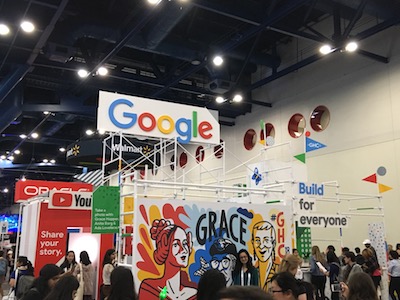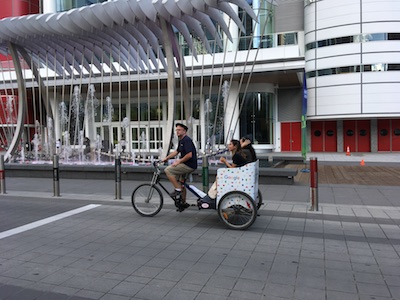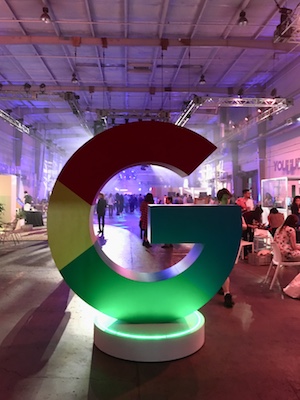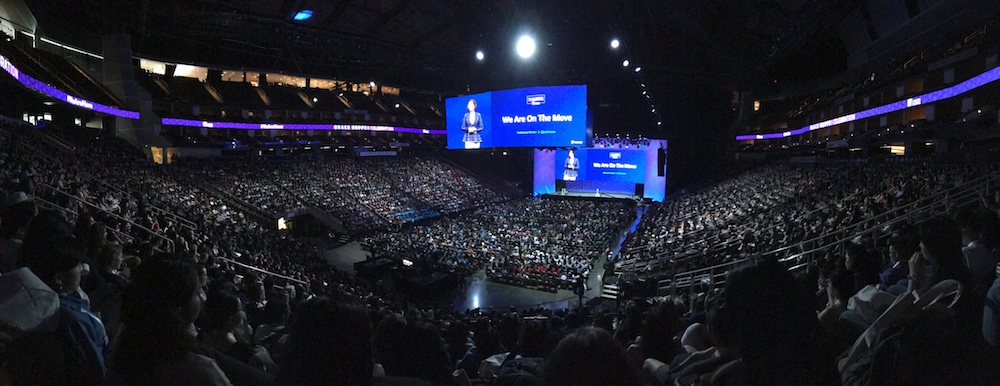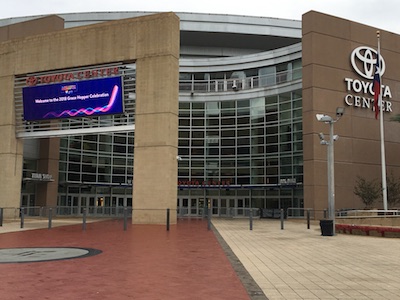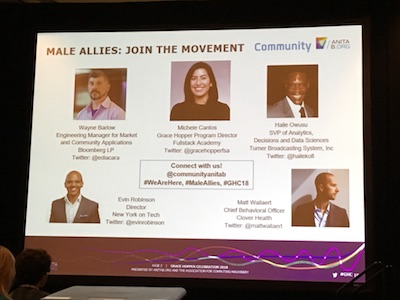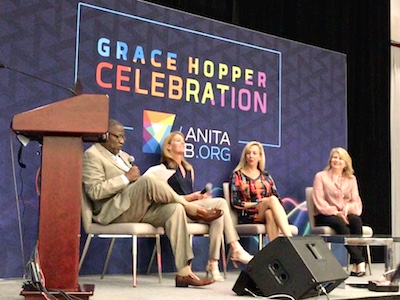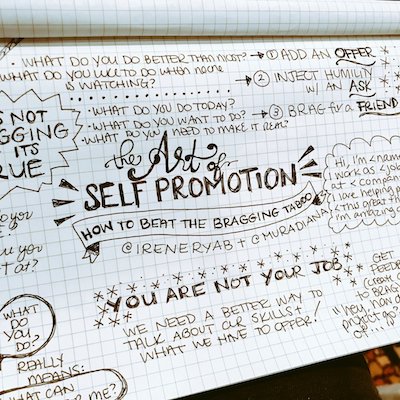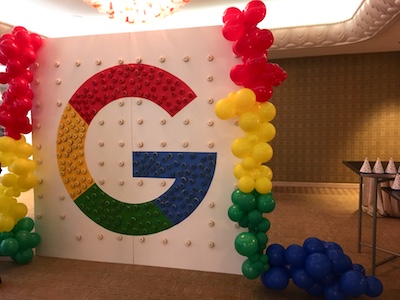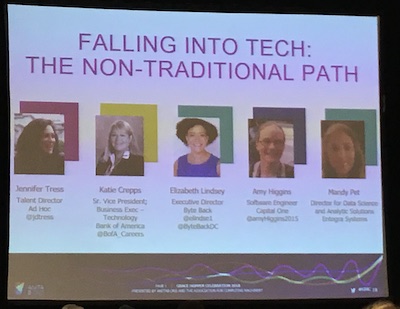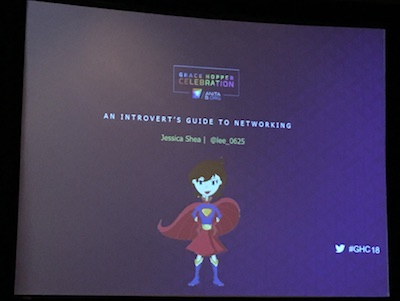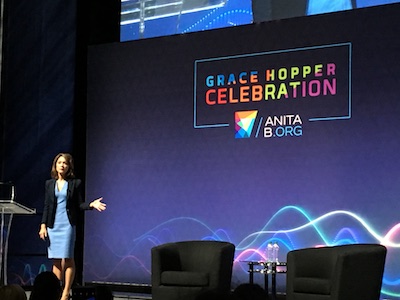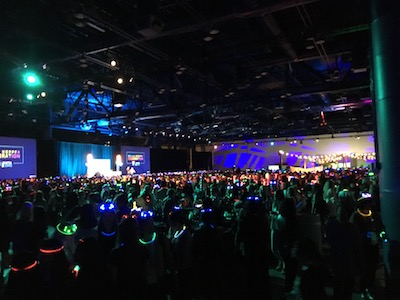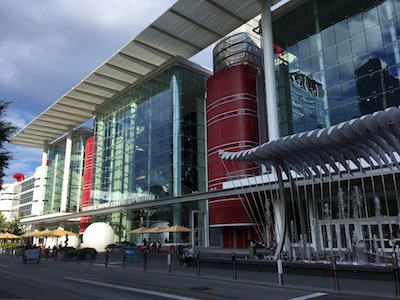Thoughts on Grace Hopper Celebration 2018
Thoughts in a page
A male friend asked me, “why would a guy want to attend Grace Hopper?” It’s a fair question, one I even asked myself before buying my ticket. I told him: Equality isn’t just a woman’s issue. Men need to be involved if change is going to occur. Even sitting on the sidelines prevents progress. The more men that get involved and advocate, the more likely we can improve things and the better off we will all be.
Having said that, it crossed my mind, “should I be taking a ticket away from a woman?” Honestly, I still feel a little badly about this, especially as I saw women trying to get tickets up until the conference began, but the encouraging reception I received from female attendees reinforced my decision, they want men to be involved.
As a man, I was definitely in the minority; I estimate there were three to five hundred men walking around amidst the 20,000 attendees. It’s worth noting this provided me a very tiny window into what women in tech experience every single day: there only being a few people, if any, in the room who look like me. This is exactly the type of experience that builds empathy, and I encourage any man to attend.
I focused on sessions around diversity and inclusion, wanting to expand my experiences, build empathy, and continue to learn how to be an ally. When those weren’t available for a time slot, I chose sessions that interested me, some of which I even knew the presenters.
One key takeaway was the sincerity of everyone involved. The presenters were genuinely interested in being there and discussing their topics, eager to speak with audience members afterwards. The attendees (mostly women) were welcoming and open to others around them, sharing personal experiences and connecting with authenticity. I felt welcome to be present and encouraged to participate.
Notes about each session I attended are found below, but it’s worth calling out that Male Allies was well worth the time. The room was pretty full (150-300 people) and split almost fifty-fifty across gender. The moderator and four panelists had a great discussion covering misconceptions about male allyship, examples of good and bad allies, being an ally when it comes to hiring practices, and the seemingly inevitable question of navigating relationships with female colleagues after the #metoo movement (most men know how to act…be a good human). An interesting note, one panelist said there were more men in this year’s Male Allies session then he remembers seeing at the whole conference last year.
I’ve never attended a conference of this size. With over 20,000 attendees this is an absolutely huge conference, especially intimidating for an introvert. Getting from one session to another often meant a 20 minute walk. By the end of the four days, I was physically and mentally exhausted, yet intellectually energized and hopeful for our future.
Conference observations
- The magnitude is overwhelming (especially to an introvert).
- Women were happy to see a man present and engaged.
- A wool t-shirt is better than a cotton one.
- I was usually one of a handful of men in the sessions.
- The airplanes to and from the conference were easily 95% female.
- Volunteering Friday night was outside my comfort zone and a great experience.
- The Googler breakfast was worth the effort to get up early (when I was really tired).
- Great to see uni-sex bathrooms to handle the disproportionate gender difference.
Lessons learned
- Old-school business cards are still the easiest way to exchange info.
- Carry a light day-backpack with some snacks and water to tide you over when needed.
- Schedule time for yourself to recharge and rest. I was even quoted by Inside Google!
- Be prepared to do a lot of walking.
- Pre-register for events as soon as registration opens online.
- Give yourself a minimum of 30 minutes between sessions.
How to be an ally
- Attend GHC or another conference (like Hopper x 1 Seattle) that supports diversity in technology.
- Read:
- Men as Allies: Engaging Men to Advance Women in the Workplace by the Center for Women and Business at Bentley University; includes suggestions for how men can be allies, how women can encourage men to be allies, and how to launch a male allies group.
- A summary of Women in the Workplace 2018 by McKinsey & Company; the full report is available at WomenInTheWorkplace.com.
- Men in the Workplace by Fairygodboss and Artemis Connection; an exploration of what men think of gender diversity in the workplace.
- The State of Gender Diversity in the Workplace 2016 by Fairygodboss; interesting statistics from various studies and suggestions for employers to improve their recruitment and retention of women.
- Watch:
Resources
- GHC 18 Opening Keynote
- GHC 18 Closing Keynote
- @ghc - my Twitter list of speakers, panelists, and smart people from GHC18
Session Thoughts and Notes
Google Kickoff
A huge warehouse party for Google employees the Tuesday night before the conference began, with food, drinks, games, art, and ~800 Googlers. Very cool.
Ability is universal, opportunity is not.
Opening Keynote
This is what 20,000+ women (and a few hundred men) look like in Houston’s Toyota Center.
Padmasree Warrior (@padmasree), CEO of NIO U.S., emphasized how “mobility means freedom” for everyone, especially women. Software defined hardware is the combination of the two disciplines and the future of technological growth. She was an engaging speaker with entertaining stories and wise words of advice.
- Understand the impact of technology across different industries.
- Work across boundaries.
- Be intellectually curious and humble.
- Don’t run from a job, run to one.
Jessica Mathews (@jessomatt), founder of Uncharted Power at 22 years old, had boundless energy on stage and it was contagious. Describing herself, she “aspires to be the love child of Beyoncé and Bill Nye the Science Guy.” She didn’t plan to found a company or start a business, she merely followed her passion to help others (bringing power to areas without it) when she was doing a class project while attending university. She developed a soccer ball (the Soccket) that used kinetic energy to charge a battery which could then be used to power other electrical items in homes. When she discovered girls weren’t able to play outside after the age of 12 in a refugee camp, she created a jump rope (the Pulse) to do the same thing and even demonstrated it on stage (see 1:08:01 in the keynote video).
Just because it’s not your plan doesn’t mean it’s not your destiny.
If I wasn’t a black woman, I don’t think I would have gotten this far. Being underestimated was the best thing that has ever happened to me.
Mariana Costa Checa (@mcostach), co-founder of Laboratoria in Peru, was the Abie Award winner for Change Agent and told the story of how their company was started. Laboratoria helps women in Latin America develop careers in tech through various bootcamps.
Solve for X, a spoken word poem performed by Amira Smith (see 1:27:40 in the keynote video). Very well done and worth watching!
Male Allies
Moderated by Michele Cantos (@michele_cantos, @gracehopperfsa) with the following panelists: Matt Wallaert (@mattwallaert), Haile Owusu (@hailekofi), Wayne Barlow (@ediacara), and Evin Robinson (@evinrobinson).
This was a great discussion, especially for men new to the concept of calling themselves an ally.
The misconceptions about being a male ally:
- It’s often not received as a positive by other men, especially if they don’t understand the term. Being an ally is about speaking up instead of being silent.
- Building empathy is key to gaining understanding. Examining why allies are needed with others will help them empathize.
- Women are concerned that partnering with a man in a business will diminish their accomplishments, which really depends on the character of the man they partner with.
Examples of being an ally:
- Understand and accept that it’s a learning process; you’ll make mistakes along the way. Introspection and working on yourself is a big part of understanding why you made them and how to change your behavior.
- Influencing other men is the primary work of an ally.
- Having a female you trust who can be open and honest with you will be helpful, but don’t put the onus on them to teach you. It’s your responsibility to learn through reading, podcasts, and personal experiences.
- Be open to feedback and criticism. Good intentions can sometimes lead to poor implementation. One panelist gave an example of a friend who didn’t realize their hiring practices were biased until it was pointed out to him.
- Invoke your right to not answer certain questions in the workplace that women are stereotypically asked (previous salary, family circumstances, etc.).
- Share your salary information with women to help them know what to expect and understand their value to companies. It’s quick and easy.
- Create an anonymous feedback form and then link to it in your email signature. Allows people to submit concerns that might be embarrassing or cause conflict.
How an ally can improve hiring practices:
- Get a diverse set of applicants. Think outside of your usual channels for sources, such as partnering with all-female schools and organizations.
- Be deliberate in your hiring and don’t get stuck looking for a certain type of candidate.
- Slow down so that your inherent bias doesn’t play as big of a role.
- Overcome bias by creating structure, such as blind reviews of resumes and applicant information. One panelist uses a service that anonymizes resumes and he has all applicants submit through that process.
An audience member asked for thoughts on navigating relationships with female colleagues after the #metoo movement.
- Most men know how to act.
- It breaks down to “be a good human.”
- Include women in the informal networks we create around work.
- Reflect on your own behavior. If you do something offensive, it’s not the end of the world but it is an opportunity to learn and grow.
- Don’t re-victimize someone.
Haile: We can’t fix the problems of inequity by treating everyone the same, you’ll end up stabilizing the existing situation.
How Will Tech Power Up an Inclusive Workforce?
Moderated by Brian Reaves (@BrianKReaves) with the following panelists: Robin Hauser (@rubie226), Michelle Bailey (@mbailey316), and Elizabeth Gore (@ElizabethGore).
The session started with a viewing of the trailer for Bias, a new documentary by Robin Hauser, the director of Code: Debugging the Gender Gap (available on Netflix). They described unconscious bias as a survival heuristic and posed the question of whether or not we can get away from our “like me” bias. People don’t think we’re bias, it’s difficult to see our own biases.
The panelists went on to discuss the bias already present in AI because of the lack of diverse developers creating it. We need to have a diverse group creating machine learning algorithms to avoid inherent bias.
- Robin: Don’t ask personal questions until the end of the interview.
- Robin: Don’t trust your gut! Ask others for input instead.
- Michelle: Companies that don’t address and incorporate diversity goals and measurements will be hurting in 5-10 years.
- Brian: For job interviews over video conference, present an avatar to the interviewer that represents their inherent biases instead of the candidate’s real face.
The Art of Self-Promotion
Presented by Irene Ryabaya (@IreneRyab) and Diana Murakhovskaya (@MuraDiana), co-founders of Monarq Incubator (@MonarqIncubator).
Sketchy note graphic by Cheryl Couris (@cherylcouris), Google UX Designer.
Describing herself as a professional feminist after experiencing the misogyny in the venture capital industry, Irene Ryabaya gave an engaging presentation about promoting yourself. Some takeaways:
- When you meet someone new they want to know how you’re awesome, so they can figure out how you can help them.
- Watch out for imposter syndrome!
- Your job is what you do, not who you are. Say “I work as an engineer,” not “I’m an engineer.”
- Three things to do:
- Add an offer (when you’re describing your awesomeness).
- Inject humility with an ask (so you don’t come off as an asshole).
- Brag for a friend.
Google Breakfast
It was wonderful to meet and chat with other Googlers that are passionate about equality in our industry. An early morning start, but well worth the effort to connect. Each table included 7-9 Googlers and an executive, opening up discussions to gain insights into managements thoughts on diversity, GHC, and any topic that came to mind. My table group included David Lieb (@dflieb), Product Director of Google Photos and (previously) co-founder/CEO of Bu.mp.
Falling Into Tech: The Non-Traditional Path
Presented by Elizabeth Lindsey (@elindse1 of @ByteBackDC), Amy Higgins (@amyHiggins2015), Mandy Pet, Katie Crepps, and Jennifer Tress (@jdtress).
As someone with a B.S. in Accounting who first moved into technology in the late 1990’s by learning system administration on the job (in my accounting firm), a lot of reading, and taking trade classes, I was particularly interested in hearing these women’s stories.
Key takeaway: You don’t have to be a software developer to work in the technology field. In fact, bringing other areas of expertise to the field increases diversity and improves the experience for everyone. There are many other opportunities in the industry! Spend time finding out what they are by talking with people in the industry, reading articles, listening to podcasts, combing job postings, and then keep your interests, education, and experience in mind to find a good fit.
What drew you into tech?
- That technology is embedded in everything we use every day. It’s an integral part of our lives.
- Tech enables everyone and has the opportunity to help with poverty and other inequitable areas.
- To affect more people and help society, en masse.
- Loves a good challenge and there are tons of problems in technology to solve.
Words of advice:
- Know your stuff and be smart about your business.
- Take on new, challenging roles and opportunities.
- On mentors: Seek out a mentor for specific areas where you need help, don’t have the experience or knowledge. Avoid a one-size-fits-all mentor, instead choose a mentor for a specific area or skill you want to build.
- “A day without learning is like a day without breathing.” Embrace a growth mindset.
- Ask for help from family and friends when you need it. It’s not ALL your responsibility because you made the choice to accept challenging opportunities.
- Individual contributors (ICs) should push upward to management, emphasize the importance of improving diversity to them.
- Non-traditional origins tend to make better recruits in Jennifer’s experience as a talent recruiter.
Building Your Persona
Presented by Soha Hassoun (@sohahassoun) and Ayanna Howard (@robotsmarts of @zyrobotics), both of @CRAWomen.
People don’t remember content, they remember how you made them feel.
First impressions are important!
- Ahead of time, prepare a 2-liner and practice it so it’s a natural and
comfortable response during an introduction. Use the same 2-liner over time.
- 1st sentence: brag about your accomplishments by incorporating them (title, education, position, awards).
- 2nd sentence: end with a question or something that requires a response.
- In a group, go to someone you don’t know and get out of your comfort zone.
People will find you online. Don’t try to create separate personas for your personal and professional sides.
- At least have one online presence, even if it’s a simple web page or LinkedIn profile. If you don’t have one, people will wonder why, among other questions.
- Think strategically about what information you want to share with the world. If you’re concerned people will judge you for what you share, limit it to content you feel is safe.
- Project how you want to be seen.
- Use a picture that looks like you, not one that’s 20 years old.
How to Foster an Authentic and Consistent Personal Brand
Moderated by Lilia Abaibourova (@abaibourova) with the following panelists: Mary Kopczynski (@MaryKopczynski), Erin Summers (@ErinEngineering), Irene Ryabaya (@IreneRyab), and Cindy Alvarez (@CindyAlvarez).
Your brand is what people say about you when you’re not in the room.
This was an interesting discussion with women who have started their own successful businesses and risen to executive ranks in companies. Topics such as how they transitioned into technology, combatted the naysayers, took control of their personal brand, and handled misinterpretations of it.
- Mary Kopczynski: “If you can’t beat them, beat them anyway.” [followed by huge applause]
- Determine what you’re interested in and then try to find a niche.
- Avoid the “rescue me” mentality that comes from “if I work really hard someone will notice me and give me a great job with lots of money.” Look for jobs you want and then work towards them.
- Ask your friends and coworkers what people say about you when you’re not present. Honest people will give you the truth without being assholes.
- On handling misinterpretation of your brand, sometimes you have to feed people the words and phrases you want them to remember about you. An example provided was when Erin had to give a poor manager the exact words he needed in order to get her promotion approved.
Changing the Tires at 60 MPH - A User Migration Story
Presented by Beilan Wang of HBO (@HBOCareers).
I worked with Beilan at HBO when she was engaged on this project. They had to migrate all of the users (millions) from HBO Now, serviced completely by a third party, to the infrastructure built in-house by HBO for HBO Go. It was fascinating to see her explain the depth and care with which her team approached this gargantuan task. She also used some entertaining Game of Thrones examples to make a point about the difficulties of handling name changes in the middle of a migration (hint: Jon Snow).
An Introvert’s Guide to Networking
Presented by Jessica Shea (@lee_0625).
As an introvert, this is something I’ve had to focus on over the years. It’s not easy to move yourself outside of your comfort zone and handle the stereotypical networking events.
Recommendations from Jessica:
- Let your work speak for itself and people will learn to trust you, which will build a small network.
- Promote your work with brown bag presentations at work or small meetups.
- Find a mentor to help you build your skills and your network.
- Networking is not small talk (the bane of introverts).
- Make a connection with personal observations and use those as conversation starters.
- Help others. Find a pain point in their life and then help them, if you can.
- Realize when your battery needs to be recharged and do that! If you can only handle an event for 1 hour, then attend but limit your time to preserve your positive state of mind while you’re present.
- Networking is not superficial. It’s about building relationships and a community.
My personal strategy: I’ve found that I get little personal benefit from large networking events, preferring to connect one-on-one. I enjoy interacting with people individually and make time for that in my daily work hours. Having coffee or lunch with a different person every week eventually builds a good sized network and doesn’t stress me, quite the opposite, I enjoy connecting with others on this level. Reach out to people with a sincere ask or goal and they’ll usually be happy to meet. Sincerity is key to creating a solid network. And remember to pay it forward when you’re in a position to.
Gender Partnership - Building an Inclusive Future
Presented by Mike Tietel (@mtietel), Kelly Toenges, and Molly Gantz from Thomson Reuters.
Recommendations from the working group and presenters:
- Understand that we all have a shadow of influence. It’s how we emulate
people around us…and vice versa.
- Remember that everything we say and do casts a shadow.
- Our shadows can permit negative and unhealthy behaviors as well as restrict them.
- When meetings were unproductive or dominated by certain individuals, one person suggested the company/group adopt a universal Meeting Bill of Rights. It could include rights such as no interrupting, examples of how to behave, and the right to refuse if an agenda is not provided.
- Give voice to those who are ignored or spoken over.
- Executive brown bag lunches for networking are more inclusive than a bar after work or golfing.
- Handling inappropriate jokes:
- Ask the person to explain the joke. “I don’t understand that, could you explain it?”
- Have different genders and members of other groups (ethnicity, race) review items (swag, advertisements) before ordering.
Breaking Up the Boys’ Club of Silicon Valley
Presentation by Emily Chang (@emilychangtv), author of Brotopia. Q&A session moderated by Radha Jhatakia (@radha_jhatakia).
This industry has an obligation to be what the next generation needs to see.
Emily was an engaging speaker with an interesting tale of how her book began and the experiences while writing it. The following are some highlights from her presentation and the Q&A.
- The tech industry created the pipeline problem by generating the
stereotypical (young, male, white) computer nerd.
- There was a 1967 article in Cosmopolitan, “The Computer Girls” (link), that was an advertisement geared towards bringing women into the industry because it didn’t fit the traditional idea of masculine work.
- The myth of the meritocracy makes us blind to the inequality. Michael Young, a British sociologist and reformer, coined the word meritocracy, meaning it as a pejorative, a sarcastic mockery of the elite class hiding and justifying the class system from which they benefit (New York Times article).
- All Raise is a venture capital firm whose mission is to accelerate the success of female funders and founders.
- On being successful and happy:
- Be authentic. Be yourself.
- Write down your values.
- Find people who share your values but don’t look like you.
- Look for a company that shares your values; vote with your feet if they don’t.
- Require diverse interviewers.
- Keep existing women happy; create an environment where women thrive.
- Passing the buck is rampant in the tech culture: they didn’t create the problem so they don’t consider it theirs to fix.
Team Up for (Un)comfortable Conversations at Work
Presented by Philip W. Braddock (Atlassian), Claire Bianchi (Salesforce), and Shannon Winter (Atlassian).
While working together at Atlassian, Claire and Shannon felt a need to connect with other women in the company and began Women Wednesdays. It was a monthly meeting where women and allies were welcome to come together for discussions about all sorts of topics, but diversity was one of the most prominent. They made sure that the meetings were a safe environment and the discussions were confidential (no notes or recordings).
One topic that took a significant amount of time in our working group was how women tend to say “sorry” more frequently than men and when they don’t really mean to apologize, rather, they’re using it as a means of being polite. Almost everyone at my table admitted to doing this repeatedly and when they shouldn’t have. Why Women Apologize and Should Stop, in the New York Times.
Recommendations for creating a meeting series in your own company/group:
- Make them safe and confidential.
- Send reminders ahead of time.
- Encourage others to speak during the meetings, especially if a few people seem to be dominating the discussion.
- Interrupt the interrupters!
- Invite guest speakers. Be sure to invite women of diverse backgrounds.
- Open to men…you’ll find that few men actually attend.
- Although, some sessions would be closed to men, especially if they focused on sensitive topics.
- How to create topics:
- Select a single word as a theme to begin discussions. They found this worked well even without being able to anticipate where the conversation would go.
- Ask for suggestions from participants.
- Discuss current events.
My team, Cloud Docs, has a weekly gender diversity discussion group that incorporates several of these suggestions. At the moment, we’re reading through a book (we voted on) and discussing a chapter each week. In any given week, probably half of the people don’t read the chapter, but can relate to and engage in the discussion, regardless. I really enjoy the discussions and miss the weeks we don’t meet. It has been a great way to know some of the people in my team who have similar views about diversity. Some of our discussions have lead to initiatives beyond the scope of the meeting group.
Google booth at the Friday night Celebration Party
About 8 of us handed out 5,000 t-shirts in 1 hour! It was a little bit insane and I didn’t have much of a voice left afterwards. We also handed out drawstring backpacks, glow stick necklaces, glowing glasses, and glow bars (the size of a small umbrella) that were lighting up the rest of the party for hours.


